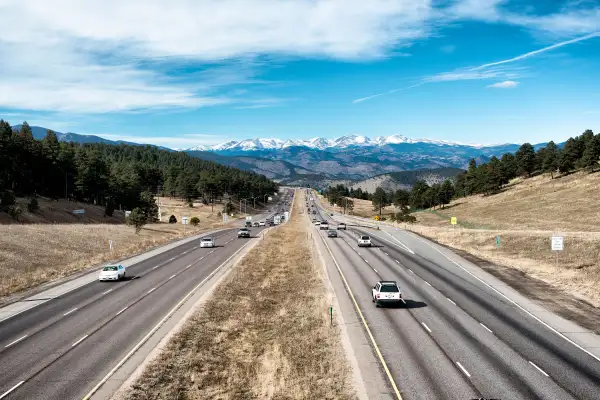Nation's Priciest Toll Road Could Cost $30 to Drive Only 13 Miles

Traffic can be hell in many parts of the country. But one stretch of a major interstate highway is exceptionally bad during a seemingly odd time: on the weekend rather than the workday rush hours.
We're talking about the "mountain corridor" of I-70, which connects Denver to world-famous Colorado ski resorts like Breckenridge and Vail. Throughout the winter, it's become standard for eastbound traffic to come to a crawl once a week like clockwork—on Sunday, when weekend skiers are heading home from the mountains. When it's snowing, bad traffic gets much, much worse. One driver recalled falling asleep at the wheel for an hour (with the car in Park) while traffic was at a standstill on a snowy Sunday in 2014. No one around him stuck in the traffic jam even noticed.
This winter, though, traffic patterns are expected to change thanks to the planned December opening of the I-70 Mountain Express Lane, a 13-mile eastbound toll lane stretching from Empire through the Veterans Memorial Tunnels in Idaho Springs.
As the Denver Post reported, the public is being invited to comment on toll rates charged for access to the road. The Colorado Department of Transportation has suggested rates ranging from $3 to $30, with the exact price at any given time based on how congested traffic is on the main highway. So-called "congestion pricing" dictates that when regular I-70 traffic is bumper to bumper, vehicles that want to enter the faster-moving Mountain Express Lane would have to pay top dollar. The number of cars allowed in the express lane would be restricted in order to ensure traffic keeps flowing smoothly at speeds of at least 45 mph or so.
State officials have not yet determined official toll rates. If they wind up allowing the fee to go as high as $30, the rate of $2.31 per mile would make the Mountain Express Lane easily the country's most expensive toll road. Major toll roads around the country typically charge less than 15¢ per mile, and all but a few have rates that average under 50¢ per mile.
Still, it might be easy for skiers to stomach the vastly higher rates on the Mountain Express Lane since it's a one-time, limited fee—and since it's assumed that it's just another cost in what's already a very expensive vacation. A one-day lift ticket at a resort like Vail can easily exceed $100 per person, so forking over another $25 or $30 could seem like peanuts if it saves you a good chunk of time. "For a family that has just spent thousands of dollars on a ski vacation weekend," the Denver Post summed up, "it may be worth $30 to ensure an on-time arrival at the airport."
That's assuming that taking the toll road will save drivers enough time to help catch a flight. The lane is only 13 miles long, and the drive from Vail to Denver's airport is a total of 120 miles.
MORE: 4 Tips to Avoid Road Tolls
